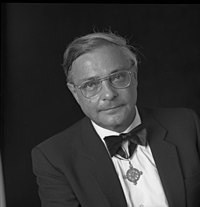Werner Reichardt
Werner Ernst Reichardt (born January 30, 1924 in Berlin ; † September 11, 1992 in Tübingen ) was a German physicist , biologist and co-founder of biocybernetics .
Life
Werner Reichardt already worked as a student in Hans Erich Hollmann's private laboratory , where he became familiar with the ultra-short wave technology he had developed . Because of his knowledge, he was drafted into the Air Force as a radio measurement technician in 1939. There he came into contact with opponents of the regime and subsequently established a secret radio link with the Western Allies. Shortly before the end of the war, the group was blown up and Reichardt was arrested by the Gestapo and sentenced to death, but was able to flee from the execution of the sentence.
From 1946 to 1950 he studied physics at the Technical University of Berlin . From 1950 he was Ernst Ruska's doctoral student at the Fritz Haber Institute of the Max Planck Society Berlin-Dahlem and was awarded a Dr.-Ing. PhD. From 1952 to 1954 he was an assistant at this institute, where, among other things, Max von Laue was his teacher and had a great influence on his further research.
During the war, Reichardt had already met the zoologist Bernhard Hassenstein , who introduced him to biological thought processes and with whom he developed interdisciplinary theories about movement vision. In 1954 Reichardt was a postdoctoral fellow at the California Institute of Technology with Max Delbrück , from 1955 he was an assistant at the Max Planck Institute for Biophysical Chemistry in Göttingen with Karl Friedrich Bonhoeffer .
In 1958 he founded the cybernetics research group at the Max Planck Institute for Biology in Tübingen together with Bernhard Hassenstein and the electronics technician Hans Wenking . When Bernhard Hassenstein moved to the Albert Ludwig University of Freiburg in 1960 , Reichardt became head of an independent department at the Max Planck Institute for Biology in Tübingen, which became the nucleus of the Max Planck Institute for Biological Cybernetics , founded in 1968 .
At the age of 68, Reichardt collapsed and died at the end of a symposium that his colleagues and friends had organized to say goodbye to active science.
The Werner Reichardt Center for Integrative Neurosciences (CIN) in Tübingen is named after Werner Reichardt . The CIN is a cluster of excellence within the framework of the Excellence Initiative , it is one of the largest working groups in the field of interdisciplinary neurosciences worldwide.
Act
Reichardt's discoveries made a decisive contribution to the understanding of information processing in nervous systems. From joint work (with Bernhard Hassenstein and Hans Wenking) on the visual system of insects and its influence on flight orientation, the correlation model was developed, which can also be demonstrated in the human visual system and has led to a general theory of movement perception.
honors and awards
- 1965: Honorary professor at the University of Tübingen
- 1970: full member of the Academy of Sciences and Literature Mainz
- 1970: Foreign member of the American Academy of Arts and Sciences Cambridge (Massachusetts)
- 1971: Member of the German Academy of Natural Scientists Leopoldina Halle
- 1977: Foreign member of the Koninklijke Nederlandse Akademie van Wetenschappen , Amsterdam
- 1980: Pour le mérite for science and arts
- 1981: Large Federal Cross of Merit with a star
- 1984: Senator of the Max Planck Society
- 1985: HP Heineken Prize for Biochemistry and Biophysics (together with Béla Julesz )
- 1988: Foreign member of the National Academy of Sciences Washington, DC
- 1989: Foreign member of the American Philosophical Society Philadelphia
- 1989: Member of the Academia Europaea
- 1989: Honorary doctorate from RWTH Aachen
literature
- Martin Egelhaaf: Reichardt, Werner. In: New German Biography (NDB). Volume 21, Duncker & Humblot, Berlin 2003, ISBN 3-428-11202-4 , p. 296 f. ( Digitized version ).
Web links
- Literature by and about Werner Reichardt in the catalog of the German National Library
- Personal website for Werner Reichardt at the MPI with vita, list of publications and obituary
- Werner Reichardt Center for Integrative Neuroscience (CIN)
Individual evidence
- ^ Member entry by Werner Reichardt at the German Academy of Natural Scientists Leopoldina , accessed on February 7, 2016.
| personal data | |
|---|---|
| SURNAME | Reichardt, Werner |
| ALTERNATIVE NAMES | Reichardt, Werner Ernst |
| BRIEF DESCRIPTION | German physicist, biologist |
| DATE OF BIRTH | January 30, 1924 |
| PLACE OF BIRTH | Berlin |
| DATE OF DEATH | September 11, 1992 |
| Place of death | Tübingen |
